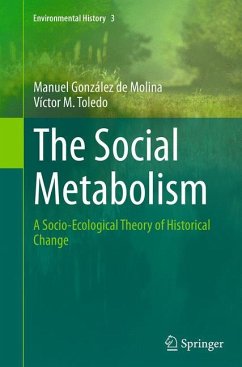Over this last decade, the concept of Social Metabolism has gained prestige as a theoretical instrument for the required analysis, to such an extent that there are now dozens of researchers, hundreds of articles and several books that have adopted and use this concept. However, there is a great deal of variety in terms of definitions and interpretations, as well as different methodologies around this concept, which prevents the consolidation of a unified field of new knowledge. The fundamental aim of the book is to conduct a review of the past and present usage of the concept of social metabolism, its origins and history, as well as the main currents or schools that exist around this concept. At the same time, the reviews and discussions included are used by the authors as starting points to draw conclusions and propose a theory of socio-ecological transformations.
The theoretical and methodological innovations of this book include a distinction of two types of metabolic processes: tangible and intangible; the analysis of the social metabolism at different scales (in space and time) and a theory of socio-ecological change overcoming the merely "systemic" or "cybernetic" nature of conventional approaches, giving special protagonism to collective action.
The theoretical and methodological innovations of this book include a distinction of two types of metabolic processes: tangible and intangible; the analysis of the social metabolism at different scales (in space and time) and a theory of socio-ecological change overcoming the merely "systemic" or "cybernetic" nature of conventional approaches, giving special protagonism to collective action.








